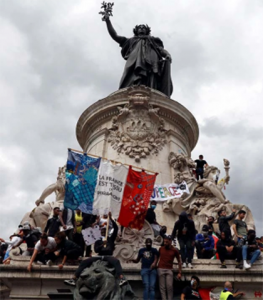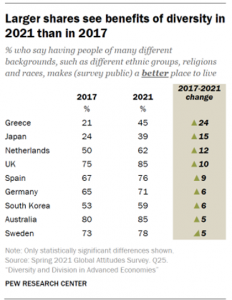Diversity valued in advanced economies – study
People in the world’s most advanced economies overwhelmingly see having people of many different backgrounds as a benefit that improves society, according to new research.
A survey by the Washington-based think tank the Pew Research Center found that a majority of people in the 17 most advanced economies say their country benefits from people of different ethnic groups, religions and races.
 In Singapore, New Zealand, the United States, Canada, the United Kingdom, Australia and Taiwan around 80 per cent of people hold this view.
In Singapore, New Zealand, the United States, Canada, the United Kingdom, Australia and Taiwan around 80 per cent of people hold this view.
“Across most of the 17 advanced economies surveyed, majorities – and in many cases, large majorities – say that having people of many ethnic groups, religions and races makes their society a better place to live,” the Pew report said.
“This opinion is most strongly held in Singapore, where 92% say that having people of different ethnic groups, religions and races makes Singapore a better place to live. Eight-in-ten or more in New Zealand, the U.S., Canada, the UK, Australia and Taiwan also say having people of many different backgrounds makes for a better place to live,” the report said.
Of the larger economies, Australia has the highest level of acceptance of diversity with 85 per cent saying it makes the country a better place to live – up from 80 per cent in 2017.
And even in Japan and Greece, where there is traditionally a low level of acceptance of diversity, the share who think diversity makes their country better has increased by double digits since the question was last asked four years ago.
But with this openness to diversity, there is a recognition that societies still have problems with racial or ethnic discrimination, the report said.
“Half or more in almost every place surveyed describe discrimination as at least a somewhat serious problem – including around three-quarters or more who have this view in Italy, France, Sweden, the US and Germany,” the report said.
 “And, in eight surveyed publics, at least half describe their society as one with conflicts between people of different racial or ethnic groups. The US is the country with the largest share of the public saying there is racial or ethnic conflict,” the Pew report said.
“And, in eight surveyed publics, at least half describe their society as one with conflicts between people of different racial or ethnic groups. The US is the country with the largest share of the public saying there is racial or ethnic conflict,” the Pew report said.
But in many countries racial matters are no longer seen as the major point of civic divisiveness.
“In the majority of places surveyed, more people identify conflicts between people who support different political parties than conflicts between people with different ethnic or racial backgrounds,” the report said.
In some places, this acrimony has risen to the level that people think their fellow citizens no longer disagree simply over policies, but also over basic facts – particularly in France, the US, Italy, Spain and Belgium.
The report also found a growing sense that societies are more divided now than they were before the COVID-19 pandemic.
“A median of 61 per cent across the 17 advanced economies say they are now more divided than before the outbreak, and in all but one of the 13 countries also polled in summer 2020, the sense that societies are more divided than united has risen significantly since last year.
“Those who describe their society as more divided than before the global health emergency are also significantly more likely to see conflicts between different groups in society and to say their fellow citizens disagree over basic facts.
Australia is one of the most united of the nations with on 29 per cent saying there is division on basic facts.
But six-in-ten Australians say discrimination against people based on their race and ethnicity is a serious or very serious problem in their country.
See the full report here: https://www.pewresearch.org/global/2021/10/13/diversity-and-division-in-advanced-economies/?utm_source=Pew+Research+Center&utm_campaign=bb9f89af58-Weekly_2021_10_16&utm_medium=email&utm_term=0_3e953b9b70-bb9f89af58-400311237












